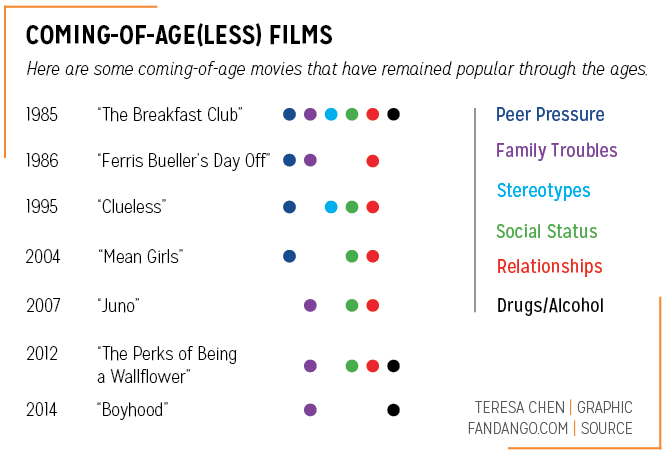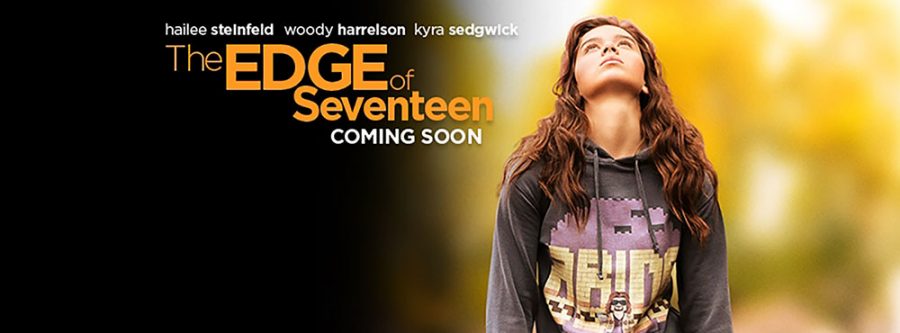Students discuss continuity, appeal of coming-of-age genre movies
“The Edge of Seventeen,” the latest in a long line of coming-of-age movies, premiers tomorrow. The film centers around the life of almost-17-year-old Nadine, an awkward teenager whose life falls apart when her best friend starts dating her brother. While many critics hail this as a classic, others have categorized it as just another typical coming-of-age movie following an all-too-familiar plot structure.
Junior Holly Metcalf said she is excited to see this movie and typically enjoys this genre.
“They do tend to all have the typical ‘angsty teen is just trying to find their place in the world,’ like, going through the same kind of stuff in every movie,” Metcalf said. “(But) I can find a different appeal in each one.”
Metcalf said one aspect in particular that draws her to these movies is how relatable they are to her as a teenager.
“The appeal of coming-of-age movies is that we see, onscreen, these other teenagers living lives like we are; we get to see what they’re going through and how they’re dealing with their life, which is just really easy to relate to,” she said.
However, junior Sarah Presley said she does not find these movies relatable, nor does she typically enjoy them. She also said the romantic aspect of coming-of-age movies is overdone.
“Coming-of-age movies and romance are (always put together),” Presley said. “And it doesn’t relate to teenagers very well, considering it’s written by adults, played by adults, for adults. Never is there actually a teenage girl playing a teenage girl.”
Indeed, in “The Edge of Seventeen,” the three teenage lead characters are played by actors who range in age from 19 to 24, while their characters are supposed to be in high school. However, IPR teacher Brenda Lester said teenagers can still find ways to relate to these movies.
 “Though they are all pretty similar in theme, the plotline of finding one’s place in the transition from child to teen fits (developmental psychologist) Erik Erikson’s theory of development that the adolescent needs to develop a sense of identity,” Lester said via email. “The teen brain is developing along with their body. The movies help make connections to life and what they are experiencing or what they see others experiencing.”
“Though they are all pretty similar in theme, the plotline of finding one’s place in the transition from child to teen fits (developmental psychologist) Erik Erikson’s theory of development that the adolescent needs to develop a sense of identity,” Lester said via email. “The teen brain is developing along with their body. The movies help make connections to life and what they are experiencing or what they see others experiencing.”
Based on this, Lester said she does not believe the trend of coming-of-age movies will die out anytime soon.
However, Presley said, “Honestly, (coming-of-age movies) probably will (die out). Just because right now we’re so focused on pumping out as many movies as possible and in such a short amount of time that they’re either gonna get so short and so similar that they’re gonna get sued for copyright, or they’re gonna move on.”
Lester said, “(From the trailer), I found myself being very judgmental toward characters and frustrated at the predictability of characters, (with) many stereotypes used. I am not sure how in-depth the movie would go in order to actually recognize the masks of those characters.”
Metcalf said, “I know a lot of people just think that coming-of-age movies are super cheesy and just there to be funny, but actually watch them, pay attention to what’s going on in their lives, think of how you can relate to it and just broaden your knowledge.”
Your donation will support the student journalists of Carmel High School - IN. Your contribution will allow us to purchase equipment and cover our annual website hosting costs.


































![British royalty are American celebrities [opinion]](https://hilite.org/wp-content/uploads/2024/03/Screenshot-2024-03-24-1.44.57-PM.png)


















![Chelsea Meng on her instagram-run bracelet shop [Biz Buzz]](https://hilite.org/wp-content/uploads/2024/04/IMG_2446-1200x838.jpg)
![Review: Quiet on Set: The Dark Side of Kids TV is the long awaited exposé of pedophilia within the children’s entertainment industry [MUSE]](https://hilite.org/wp-content/uploads/2024/04/unnamed.jpg)
![Review: “The Iron Claw” cannot get enough praise [MUSE]](https://hilite.org/wp-content/uploads/2024/04/unnamed.png)
![Review: “The Bear” sets an unbelievably high bar for future comedy shows [MUSE]](https://hilite.org/wp-content/uploads/2024/03/unnamed.png)
![Review: “Mysterious Lotus Casebook” is an amazing historical Chinese drama [MUSE]](https://hilite.org/wp-content/uploads/2024/03/0.webp)
![Review in Print: Maripaz Villar brings a delightfully unique style to the world of WEBTOON [MUSE]](https://hilite.org/wp-content/uploads/2023/12/maripazcover-1200x960.jpg)
![Review: “The Sword of Kaigen” is a masterpiece [MUSE]](https://hilite.org/wp-content/uploads/2023/11/Screenshot-2023-11-26-201051.png)
![Review: Gateron Oil Kings, great linear switches, okay price [MUSE]](https://hilite.org/wp-content/uploads/2023/11/Screenshot-2023-11-26-200553.png)
![Review: “A Haunting in Venice” is a significant improvement from other Agatha Christie adaptations [MUSE]](https://hilite.org/wp-content/uploads/2023/11/e7ee2938a6d422669771bce6d8088521.jpg)
![Review: A Thanksgiving story from elementary school, still just as interesting [MUSE]](https://hilite.org/wp-content/uploads/2023/11/Screenshot-2023-11-26-195514-987x1200.png)
![Review: When I Fly Towards You, cute, uplifting youth drama [MUSE]](https://hilite.org/wp-content/uploads/2023/09/When-I-Fly-Towards-You-Chinese-drama.png)
![Postcards from Muse: Hawaii Travel Diary [MUSE]](https://hilite.org/wp-content/uploads/2023/09/My-project-1-1200x1200.jpg)
![Review: Ladybug & Cat Noir: The Movie, departure from original show [MUSE]](https://hilite.org/wp-content/uploads/2023/09/Ladybug__Cat_Noir_-_The_Movie_poster.jpg)
![Review in Print: Hidden Love is the cute, uplifting drama everyone needs [MUSE]](https://hilite.org/wp-content/uploads/2023/09/hiddenlovecover-e1693597208225-1030x1200.png)
![Review in Print: Heartstopper is the heartwarming queer romance we all need [MUSE]](https://hilite.org/wp-content/uploads/2023/08/museheartstoppercover-1200x654.png)



























![British royalty are American celebrities [opinion]](https://hilite.org/wp-content/uploads/2024/03/Screenshot-2024-03-24-1.44.57-PM-600x543.png)


![The new “Kung Fu Panda 4” movie: a journey of growth, self-realization and adventure [opinion]](https://hilite.org/wp-content/uploads/2024/03/po-600x294.png)

![Oscars season drama is inevitable with snubs (and not-snubs), but the drama is what makes it fun [opinion]](https://hilite.org/wp-content/uploads/2024/03/Screenshot-2024-03-10-2.11.32-PM-600x319.png)